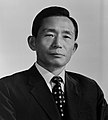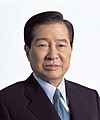 |
환영합니다! / Welcome To The South Korea Portal!  South Korea, officially the Republic of Korea (ROK), is a country in East Asia. It constitutes the southern part of the Korean Peninsula and borders North Korea along the Korean Demilitarized Zone; though it also claims the land border with China and Russia. The country's western border is formed by the Yellow Sea, while its eastern border is defined by the Sea of Japan. South Korea claims to be the sole legitimate government of the entire peninsula and adjacent islands. It has a population of 51.96 million, of which half live in the Seoul Capital Area, the ninth most populous metropolitan area in the world. Other major cities include Busan, Daegu, and Incheon. The Korean Peninsula was inhabited as early as the Lower Paleolithic period. Its first kingdom was noted in Chinese records in the early 7th century BCE. After the unification of the Three Kingdoms of Korea into Silla and Balhae in the late 7th century, Korea was ruled by the Goryeo dynasty (918–1392) and the Joseon dynasty (1392–1897). The succeeding Korean Empire (1897–1910) was annexed in 1910 into the Empire of Japan. Japanese rule ended following Japan's surrender in World War II, after which Korea was divided into two zones: a northern zone occupied by the Soviet Union, and a southern zone occupied by the United States. After negotiations on reunification failed, the southern zone became the Republic of Korea in August 1948, while the northern zone became the communist Democratic People's Republic of Korea the following month. In 1950, a North Korean invasion began the Korean War, which ended in 1953 after extensive fighting involving the American-led United Nations Command and the People's Volunteer Army from China with Soviet assistance. The war left 3 million Koreans dead and the economy in ruins. The authoritarian First Republic of Korea led by Syngman Rhee was overthrown in the April Revolution of 1960. However, the Second Republic failed to control the revolutionary fervor. The May 16 coup of 1961 led by Park Chung Hee put an end to the Second Republic, signaling the start of the Third Republic in 1963. South Korea's devastated economy began to soar under Park's leadership, recording the one of fastest rises in average GDP per capita. Despite lacking natural resources, the nation rapidly developed to become one of the Four Asian Tigers based on international trade and economic globalization, integrating itself within the world economy with export-oriented industrialization. The Fourth Republic was established after the October Restoration of 1972, in which Park wielded absolute power. The Yushin Constitution declared that the president could suspend basic human rights and appoint a third of the parliament. Suppression of the opposition and human rights abuse by the government became more severe in this period. Even after Park's assassination in 1979, the authoritarian rule continued in the Fifth Republic led by Chun Doo-hwan, which violently seized power by two coups and brutally suppressed the Gwangju Uprising. The June Democratic Struggle of 1987 ended authoritarian rule, forming the current Sixth Republic. The country is now considered among the most advanced democracies in Continental and East Asia. (Full article...) Selected article -Park Chung Hee (Korean: 박정희; November 14, 1917 – October 26, 1979) was a South Korean politician and army general. After seizing power in the May 16 coup of 1961, he was elected as the 3rd President of South Korea in 1963. He ruled the country from 1962 until his assassination in 1979. He is regarded as one of the most consequential leaders in Korean history, although his legacy as a military dictator continues to cause controversy. Before his presidency, Park was the second-highest-ranking officer in the South Korean army. His coup brought an end to the interim Second Republic of Korea. After serving for two years as chairman of the military junta, he was elected president in 1963, ushering in the Third Republic. Park began a series of economic reforms that eventually led to rapid economic growth and industrialization, a phenomenon that is now known as the Miracle on the Han River. This made South Korea one of the fastest growing economies of the 1960s and 1970s, albeit with costs to labor rights. This era also saw the formation of chaebols: family companies supported by the state similar to the Japanese zaibatsu. Examples of significant chaebols include Hyundai, LG, and Samsung. Although popular during the 1960s, Park's popularity started to plateau by the 1970s, with closer than expected victories during the 1971 presidential election and the subsequent legislative elections. In 1972, Park declared martial law after carrying out a self-coup. He then introduced the highly authoritarian Yushin Constitution, ushering in the Fourth Republic. Now ruling as a dictator, he constantly repressed political opposition and dissent and completely controlled the military. He also had much control over the media and expressions of art. In 1979, Park was assassinated by his close friend Kim Jae-gyu, director of the KCIA, following the Busan–Masan Uprising. Whether the assassination was spontaneous or premeditated remains unclear to this day. Economic growth continued in spite of the 1979 coup d'état and considerable political turmoil in the wake of his assassination. The country eventually democratized with the June Democratic Struggle in 1987. (Full article...)Selected image The Gold crown from Seobongchong Tumulus (Korean: 서봉총 금관; Hanja: 瑞鳳塚金冠; RR: Seobongchong geumgwan; MR: Sŏbongch'ong kŭmgwan), National Treasure of South Korea No. 339, is a gold crown of Silla origin that is now housed at the Gyeongju National Museum. More did you know -
In the news
This is a Good article, an article that meets a core set of high editorial standards.
 The ABU Radio Song Festival 2012 was the first edition of the biennial ABU Radio Song Festivals, organised by the Asia-Pacific Broadcasting Union (ABU). The festival took place in the KBS Hall, which is located in the South Korean capital of Seoul and coincided with the 49th general assembly of the ABU. The ABU Radio Song Festival attracted twenty-six original entries representing eighteen radio broadcasters from fifteen countries, which competed in a preliminary jury round. The juries selected thirteen entries from twelve radio broadcasters in ten countries to qualify for the final show which was held on 11 October 2012. Fifteen entries were originally selected to participate in the grand final. However, Fiji and Sri Lanka withdrew from the radio competition prior to the final show, and thus only thirteen entries participated in the competition on 11 October 2012. South Korea won the Grand Prix award with the song "For a Rest" performed by boy band Billy Acoustie. Danielle Blakey representing Australia won the gold award with the song "Fearless", Brunei received the silver award with the song "Yang Terindah (So Beautiful)" performed by Maria Aires, with Sammy Ray Jones also representing Australia receiving the bronze award with his song "Rinet". K-Town Clan representing Malaysia received the special jury award with their song "Party Animal". The next edition was held in Colombo, Sri Lanka. (Full article...)General images -The following are images from various South Korea-related articles on Wikipedia.
Did you know (auto-generated)
WikiProjectsSee WikiProject Korea for collaborating on South Korea topics, and more broadly, on all things Korea-related. South Korea topics
CategoriesAdministrative divisions of South Korea
Related portalsEast Asia Associated WikimediaThe following Wikimedia Foundation sister projects provide more on this subject:
Web resources
SourcesDiscover Wikipedia using portals |























































